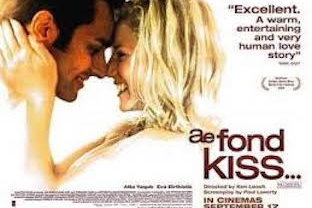Vera Drake, A Fond Kiss, The Merchant of Venice
Vera Drake
Vera Drake, a film by Mike Leigh, won the Golden Lion at the 61st Venice Film Festival. This British film won a further boost when Imelda Staunton was named as Best Actress.
When it screened halfway through the festival, headlines appeared: a film about abortion. The presumption seemed to be that Vera Drake was pro- abortion. A potential scandal makes for ready copy. This continued in most of the reporting about the film and its awards. The buzz about Vera Drake being a front-runner for the big award led to speculation about how the Catholic Church would respond. Italian journalists are said to have a reputation for being critical of the church, if not stridently anti-clerical at times, so this would provide a field day.
In the event this did not happen, although the members of the Catholic jury for the SIGNIS award (for the World Catholic Association for Communication) were alerted to the sensitivity of the situation.
Two factors contributed to a more intelligent discussion of the film. First was the film itself. Mike Leigh is a master film-maker. He has won awards in Cannes for Naked and his very moving, Secrets and Lies. Other films include the Gilbert and Sullivan portrait, Topsy Turvey as well as the picture of very ordinary London life, All or Nothing. Vera Drake is in the All or Nothing tradition. Vera Drake is a fifty year old housewife in North London in 1950. She is generous to a fault. Nothing is too much trouble for her. Everyone says she has a heart of gold. She is the proverbial good woman. The first half of the film is a moving portrait of this woman whom Imelda Stanton's performance makes memorable.
Without any lead in we are shown how she also performs syringe abortions for women and girls 'in need. She has done this for twenty years or more. Her family know nothing about it. When one girl suffers complications, hospital authorities inform the police and Vera is subject to questioning and arrest.
The second factor for discussion was Mike Leigh's press conference. He was quick to point out that his films treat social issues but never provide
unequivocal answers. He provides the equivalent of a case study (something like what seminarians explored in the past during their moral theology course). Leigh noted that, while we bring our own agenda to the story, we are invited to consider a wider range of perspectives. It is not simply, or simplistically, moral judgement by unnuanced application of moral principles. Catholic confessional practice has traditionally urged for more delicacy of conscience and a greater appreciation of what full knowledge and full consent mean in the context of responsibility for actions and for sin. Leigh said that some audiences would view Vera as a saint, committed to assisting women; others would see her as a monster, destroying lives.
Most audiences hurry out as soon as final credits roll. For those who stay, they will see that Leigh dedicates his film to his parents, a doctor and a midwife.
The difficulty with labelling a film 'about abortion' is that this merely tells us the subject, or one of the subjects, of the film. The Biblical story of David and Bathsheba is about adultery and murder but that is just a labelling description. What we need to know is 'how' these issues are presented. This is the criterion for a moral evaluation of a film. This means, as a correspondent for Vatican Radio was reported as saying on air during the Venice Festival, that Leigh's film is 'difficult and interesting' and 'avoided propaganda and tentative and facile conclusions'. Catholic teaching has always urged the faithful to condemn the sin but not the sinner.
Leigh's portrait of Vera Drake contributes to that way of looking at her despite what she does.
A Fond Kiss
For almost forty years, Ken Loach has devoted himself to films with passionate social concern. Not only is he still going strong, his reputation is higher than ever. During the last decade, he has won awards, critical acclaim and a larger following from the general public. His collaborator for the last seven or eight years has been a Scotsman, Paul Laverty, who spent some time in a seminary. This religious interest has been prominent in some of the films (like Carla's Song) and it is one of the key elements of Ae Fond Kiss.
'A Fond Kiss' is a quotation from the poet, Robert Burns. The two protagonists of this film are involved in more than a fond kiss. He is an earnest young man, a local DJ, who lives with his family, preparing for an arranged marriage. She is a music teacher at the school which his younger servant attends. The crucial information, however, is this: he is the son of Pakistani migrants to Glasgow, strictly traditional and devoutly Muslim; she is a Catholic and her school is Catholic.
The romantic element is treated as might be expected, delightful little details (like moving her piano with his local friends) and a sudden holiday in Spain (where some of the production money came from). Much of it is routine with a touch of sentiment.
The drama arises when the family discovers the truth. Once again, a lot of this is what we might expect. The Pakistani parents are adamant. The prospective in-laws are shocked. The son is defiant. Where the film is of greater interest is in the Catholic response: the principal wanting to keep the teacher but the parish priest giving her a severe lecture on moral standards and examples for the children.
Matters come to a head when the Pakistani older sister finds that her boyfriend's family will not permit a marriage because of her brother's involvement with a non-Muslim. She makes a very strong case for self- sacrifice on the part of the couple, making a plea to both parties. However, we live in a very emotional world, where sympathies for those in love are usually stronger than relying on principles.
Loach and Laverty offer us a story where the issues are clear but where the answers are very difficult.
The Merchant of Venice
The Merchant of Venice is one of Shakespeare's most popular plays both for performance in theatre as well as for study at school and university. It is surprising that it has not been filmed before except for television versions of theatrical productions.
The play has been adapted by its director, Michael Radford. Radford has a range of credits including the 1984 version of Orwell's 1984, White Mischief and the Italian tribute to Pablo Neruda and his postman, Il Postino. The text has been pruned but the essentials are there. The film has also been opened out and uses many actual Venetian locations to enhance the action, the beauty, the historical sense of the film. In fact, most of the sequences look like the paintings of Titian or Tintoretto come to life.
The film also has the advantage of an unspoken prologue which dramatises the attitude of Christians towards Jews in Venice in the late 16th century. It takes its cue from many of the indications given in the text, especially in Shylock's speeches. The film vividly shows the merchants, the Rialto, their despising of the Jews, spitting on them, Antonio spitting on Shylock. It also has sequences in the synagogue with the Jews, especially Shylock, at prayer. An explanation is given about the attitudes towards the Jews at the time, the forbidding of the Jews to own any property and hence their having to depend on money-lending and usury.
The acting also carries the film well. Al Pacino, rather more quiet than some of his more strident performances, embodies Shylock. Some of his speeches, while passionate, tend in some moments towards the low-key, which is very effective. This is true of his famous speech, "If you prick us, do we not bleed" as well as his speeches at the trial.
Jeremy Irons, of course, seems born to be the perennial martyr and brings great dignity and solemnity to the role of Antonio. The film acknowledges some of the speculation about the relationship between Antonio and Bassanio but highlights the fact that older men in Venetian society took on proteges and supported them rather than the indications of any kind of homosexual relationship. These clues are indicated in the film. Joseph Fiennes is very good as Bassanio but the surprise of the film is the American actress Lynn Collins who is a most persuasive Portia. Once again, the 'quality of mercy' speech is played somewhat low-key.
The sequences of the caskets are well done, the genial arrogance of the Duke of Morocco, the foolishness of the Prince of Arragon and the romance of Bassanio.
The film is Shakespeare particularly well spoken, articulate, poetic - with strong performances and visuals to match.
LONDON - 5 October 2004 - 1,492 words
















